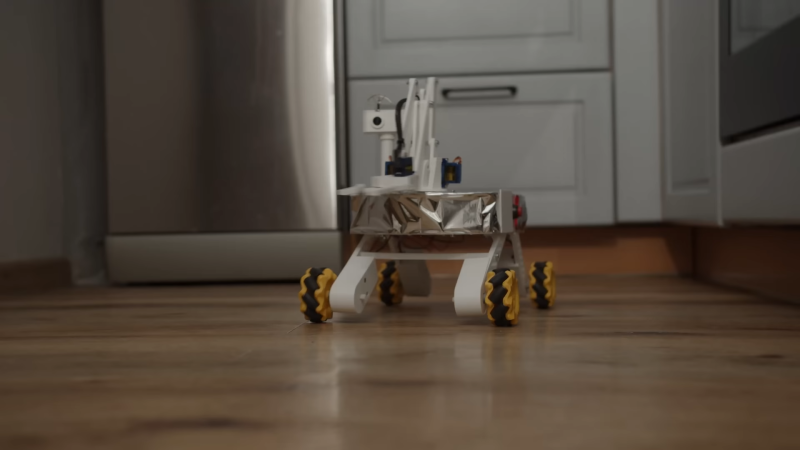NASA’s Mars Rovers are robots that have inspired many budding engineers around the world. [Nikodem Bartnik] had a particular fondness for them himself, and set out to build a miniature version of his very own.
The Raspberry Pi Pico W is the brains of the operation, serving as both microcontroller and remote wireless link for control. The robot uses four mecanum wheels for locomotion, with each getting its own motor. This allows the robot to move in all directions simply by rotating the wheels in different configurations. On top, the rover sports a articulated robot arm controlled by servos, which allows it to pick things up and put them down. Plus, there’s an FPV camera on top that delivers a video feed so the robot can be driven remotely. This is achieved over WiFi, thanks to a bit of custom control code written in Python.
It’s a surprisingly capable bot on smooth surfaces, as the mecanum wheels allow strafing and other movements that regular wheels simply can’t do. It’s also fun having a bot that can interact with its environment, thanks to its motorized appendages.
















Fun project, but I’m pretty sure those Mecanum omniwheels would fare very poorly indeed on Mars.
Not to mention the billions to get it there. Maybe launch work a tiny Saturn V?
Well, when it gets there we’ll see.
Ah yes, the perfectly flat, hardwood surface of Mars
No suspension either. It’s a nice little RoV, but not mars-related beyond the tinfoil costume.
Okay, nice. But I don’t have access to 1/10th the tools or the funds shown.
I build Mars Rover type robots all the time. Even more sophisticated. For example my Mars Rover also has husky lens for artificial intelligence and machine learning….. What do I have to do to get my Mars rovers in articles?…lol
Submit a link using the “Submit” menu option.
I like the pico, but that v1.1 of the USB is pretty sad. So having WiFi is no doubt an speed improvement under any circumstance I expect.
Pity that the WiFi version is only to be had by me for a way way higher price than the regular pico.
And that pico-w price can’t compete with the ESP32.